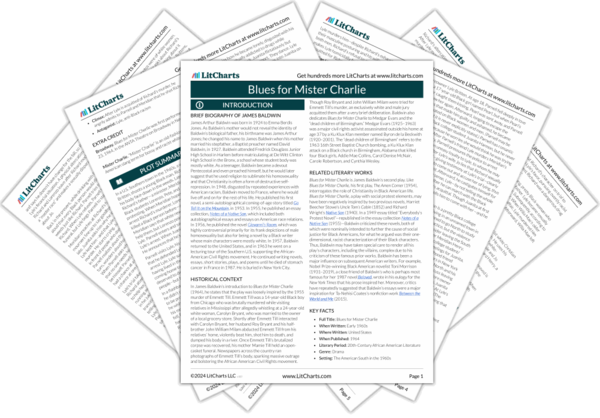Blues for Mister Charlie represents the Black Christian church as a locus for nonviolent resistance against racism, yet it also suggests that Christian teachings encourage Black Christians to endure without retaliation more oppression than they should have while bolstering racist attitudes among white people. Thus, the play portrays Christianity as a double-edged sword, both helping and hurting the cause for racial justice. The play suggests throughout that Black churches play an important role in anti-racist protesting: in the unnamed U.S. Southern town where the play’s action occurs, a Black Christian minister named Meridian Henry organizes protests out of his church, and various pieces of dialogue imply that Christian prayer is often integrated into the protests. Yet at the same time, Meridian openly wonders whether the Christian teachings of nonviolence and “turn[ing] the other cheek” has led Black Christians to patiently endure racist oppression when they ought to have been protecting themselves—with violence if necessary. Meanwhile, the town’s Christian white minister, Reverend Phelps, uses his religious authority to preach racism, claiming that Black people who protest for social equality have “turned away from God.” In this way, the play gives a nuanced perspective on the intersection of Christianity and equality, in which Christianity is neither a wholly positive nor a wholly negative force in the fight for racial justice.
Christianity and Oppression ThemeTracker

Christianity and Oppression Quotes in Blues for Mister Charlie
Lorenzo: Mother Henry, I got a lot of respect for you and all that, and for Meridian too, but that white man’s God is white. It’s that damn white God that’s been lynching us and burning us and castrating us and raping our women and robbing us of everything that makes a man a man for all these hundreds of years. Now, why we sitting around here, in His house?
Juanita: And then you wouldn’t be any better than they are.
Lorenzo: I don’t want to be better than they are, why should I be better than they are? And better at what? Better at being a doormat, better at being a corpse?
Meridian: Of course, if you go back far enough, you get to a point before Christ, if you see what I mean, B.C.—and at that point, I’ve been thinking, black people weren’t raised to turn the other cheek, and in the hope of heaven. No, then they didn’t have to take low. Before Christ. They walked around just as good as anybody else, and when they died, they didn’t go to heaven, they went to join their ancestors.
Lillian: I wouldn’t filthy my hands with that Communist sheet!
Parnell: Ah? But the father of your faith, the cornerstone of that church of which you are so precious an adornment, was a communist, possibly the first.
Meridian: I don’t think that the alleged object was my son’s type at all!
The State: And you are a minister?
Meridian: I think I may be beginning to become one.











